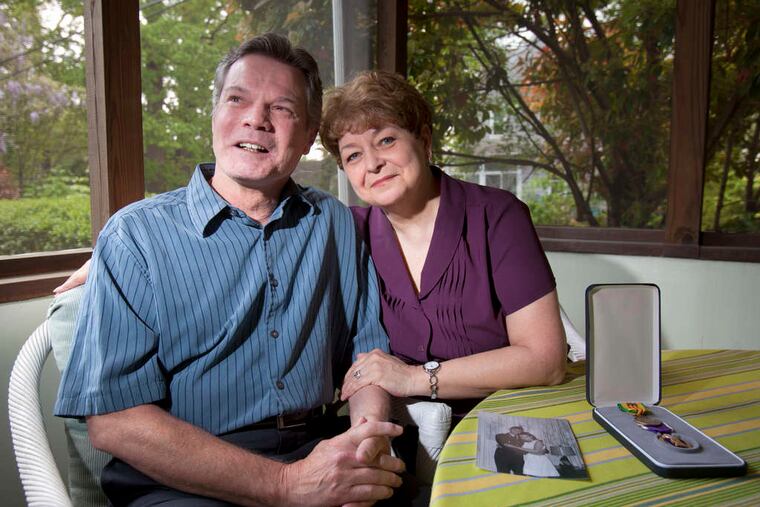Decades later, a Purple Heart
Robert James Miller remembers the terrible day he was riding on top of a military vehicle when a firefight erupted around him. A piece of shrapnel from an explosion dug deep into his left shoulder.

Robert James Miller remembers the terrible day he was riding on top of a military vehicle when a firefight erupted around him. A piece of shrapnel from an explosion dug deep into his left shoulder.
"It hit me like a white-hot hammer," he recalled.
At a field hospital, the doctor told him: "You got yourself a Purple Heart here."
That was Nov. 17, 1969. He did get a Purple Heart . . . 44 years later.
Miller, who lives in a comfortable two-story house on a leafy street in Norwood, was awarded the medal this week in a ceremony at the Springfield office of U.S. Rep. Pat Meehan (R., Pa.), whose staff helped Miller cut through military red tape.
"I was told by the Disabled Veterans of America that some people fall through the cracks," he said.
Not a day goes by that the medal isn't awarded retroactively, said John Bircher, a spokesman for the Military Order of the Purple Heart.
Some people simply get overlooked, but "there aren't too many cases of that," Bircher said.
"Most of the time, somebody didn't want to accept it - their buddy was killed or they felt people were wounded worse than they were and they didn't deserve it."
Miller, 64, said he didn't really care about the honor after he was discharged in April 1970. No one contacted him and he didn't pursue it.
"I just wanted to get home," he said, sitting in an easy chair in his living room with the reason he was so anxious to get back to Norwood - his wife, Patti.
They met Aug. 3, 1967, when Miller's mother asked him to pick up his younger sister at a bowling alley. Patti was his sister's friend and after that first day, they knew they would be together their whole lives.
"He had a girlfriend and I had a boyfriend, and we broke up with them the next time we saw them," she said. "We knew we had found each other and there was no changing our minds."
They still seem like a perfect match. She is the straight man, while he makes droll observations about love and war. She gets up early; he likes to sleep in. She's gregarious, while he avoids socializing. They have one son.
Miller was 19 and working at Boeing Vertol when he got his draft notice.
He served two years, one in Vietnam. Every day he was away, Patti, by now his fiancee, wrote him a letter. Any time he could, he wrote back.
If she didn't get one for a few days, she would be gripped with panic. But then a thin envelope would show up and she could breathe again.
"Patti my Love, Good morning. I love you. . .," he started each letter, because, he said, "if it's going to be your last letter, you know. . . ."
And on the back of the envelopes each wrote, "With love from me to you."
She threw away hundreds of letters years ago but still has a small bundle.
In one he writes about worrying that she would be different when he got home. "Promise everything will be the same as when I left," he implored.
In the days before cellphones or Skype, soldiers could be cut off from the world for a month or more, leaving them feeling "like they've been left behind," Miller explained.
After his discharge, he headed straight home. With his girl waiting, their wedding in six weeks, and the need to get a job, the medal fell off his radar.
Miller worked for 30 years for Peco, first as a lineman and then in the company's Valley Forge laboratory. When the lab closed, he worked in research and development at Sunoco for 11 years.
Miller said that a few years after the war, he had a serious bout of depression. He doesn't know if it was post-traumatic stress, but it was Patti who helped him recover.
Then about three years ago, suffering arthritis in his shoulder, he went to the Philadelphia VA Medical Center and talked to someone from the Disabled American Veterans who told him he was eligible for the Purple Heart.
Miller applied for "a correction of record" from the Army Review Board but was turned down. So he requested his military records under the Freedom of Information Act and took the documents to Meehan's office.
"There it was, proof that I was wounded in battle," he said.
Finally, the honor came through. During the ceremony Monday, Capt. David DeDonna of the Army National Guard 111th Infantry pinned the Purple Heart on Miller and presented him with three Bronze Service Stars.
Miller is one of 200,676 Vietnam veterans who have been awarded a Purple Heart for being wounded or killed in battle. A total of 1.7 million medals have been issued since they were created in 1932.
"There are no good wars," said Miller, who sees similarities between Vietnam and Iraq. "Why get involved?"
He is happy with the honor but downplays his suffering, saying others had it much worse. His neighbor was just telling him about her brother, who killed himself when he returned from Vietnam because he got a "Dear John" letter from his sweetheart.
"Things worked out very well for me," he said.